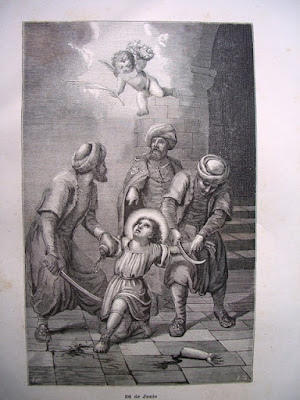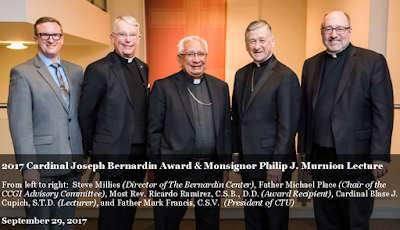Dominican Father John O'Connor died on Dec. 7, 2006 of complications from a cardiac arrest.
I thought it would be fitting to print the following excerpt from chapter 16 ("Homosexuality in Religious Orders") of Randy Engel's The Rite of Sodomy — Homosexuality and the Roman Catholic Church.
Father John O'Connor — A Life of Faith, Devotion and Courage
John F. O'Connor was born and raised in Chicago. He entered the Dominican Order in 1949. After completing a one-year novitiate in Winona, Minn., he went to the River Forest House of Studies for three years and later to St. Rose Priory in Dubuque. He was ordained in Oakland, Calif., in 1955.
Immediately afterwards, Father O'Connor began his long career as a Dominican preacher, first as a parish priest, then as a college professor of theology and philosophy. From 1969 to 1989, he was part of the Dominican Mission Band and preached throughout the United States, England and Canada. The Blessed Virgin Mary and the Rosary were prominent themes in his Mission work. In the late 1980s, he found himself once again at home at the magnificent St. Dominic and St. Thomas Priory in River Forest in the Central Province of Chicago. His Provincial Superior was none other than Father Donald Goergen.
As a faithful son of St. Dominic, O'Connor never had any difficulties with his superiors until Goergen arrived on the scene. Goergen wanted O'Connor out.
In a conversation with O'Connor in April 1986, Father Lex Goedert, the Prior at River Forest, let it slip that Goergen was going to suspend O'Connor on some pretext or another. By this time, O'Connor, due in part to his long association with Dominican Father Charles Corcoran, had become a nationally recognized opponent of the Homosexual Collective in AmChurch and in his own Dominican Order.
The fireworks began in March 1987 when Father Charles Fanelli, the pastor of St. John Baptist Vianney Church in Northlake, Ill., asked O'Connor to give a weeklong Mission at his church.
A woman who attended all of O'Connor's talks said that his powerful preaching at the mission had parishioners lining up the isles for confession and that the crowds grew larger every night. Fanelli considered the event to be a great success.
Not everyone, however, was favorably impressed with O'Connor's preaching.
At the next parish council meeting in April at St. John Vianney, the members were informed that complaints against O'Connor's preaching had been lodged with Joseph Cardinal Bernardin, Archbishop of Chicago. When O'Connor attempted to get copies of the complaints, Bernardin refused to send them to him.
On May 4, 1987, Goergen, in the company of another Dominican, Father Jim Marchionda, visited O'Connor at River Forest to discuss the complaints. During a heated confrontation, O'Connor told Goergen that Cochran had witnessed Goergen sodomizing a fellow Dominican. O'Connor reported that Goergen told him, "Homosexuality is becoming more acceptable now," and let the subject drop.
O'Connor decided to go on the offensive. On May 13, 1987, he sent Goergen a letter questioning the financial irregularities of the Province, especially in connection with the St. Jude Thaddeus Shrine operated by the Dominicans on the South side of Chicago. O'Connor made specific reference to Father "Chuck" Dahm, a member of Goergen's coterie, who had allegedly been draining the treasury of thousands of dollars to finance various left-wing political causes. O'Connor asked for an independent audit of the Province's and St. Jude's financial records.
On July 22, 1987, Goergen sent O'Connor a return salvo. Goergen told O'Connor, in response to the latter's request for a transfer, that he had no intention of reassigning him to another Province. Goergen repeated his demand that O'Connor moderate his preaching, stop mentioning people by name in his talks (especially Bernardin) and stop frightening people with verbal excesses.
Goergen stated that he wanted O'Connor to sign a letter of apology to the disgruntled parishioners at St. John Vianney who had complained to Bernardin. O'Connor, who had been physically attacked by the husband of one of the complainants, responded they were lucky he was not suing them for assault and battery. On November 3, 1987, Goergen ordered all communications between O'Connor and parties involved in the parish incident to cease.
Goergen needed a new line of attack.
On December 2, 1987, one month after O'Connor had returned from a successful speaking engagement in South Dakota, Goergen informed O'Connor that he wanted him to visit a psychological counselor. O'Connor said no dice. Goergen backed off. It was back to the drawing board.
In early 1988, Goergen made another visitation to O'Connor at River Forest. This time the Provincial stated he wanted O'Connor to stop "isolating" himself from his community of brothers. He also stated that the head of the Province of St. Joseph in New York had requested O'Connor not to enter his domain. O'Connor agreed with the latter, but said that his special dietary and health problems mitigated against his taking meals in common with his fellow Dominicans.
In April 1988, O'Connor, who had maintained contact with the Holy See on his problems with Goergen, was advised by the Congregation for Religious and Secular Institutes in Rome to obey his superior (Goergen) and, if all else fails, to consult with and follow the advice of the Dominican Master General in Rome.
O'Connor decided not to seek exclaustration. He would stay and fight.
The rest of the year remained relatively uneventful. O'Connor, as directed, limited his preaching to the confines of his own Central Province. However, much to Goergen's consternation, O'Connor's anti-Modernist tapes, which included a section against the Homosexual Collective in the Church, continued to gain greater nationwide circulation.
On March 31, 1989, O'Connor was advised that the Provincial Council of St. Albert the Great had issued an order forbidding O'Connor to preach — anywhere. The Council also recommended that he undergo a psycho-medical evaluation.
In a letter of June 13, 1989, O'Connor responded by asking Goergen if he (Goergen) was willing to repent of his homosexual life. The letter was the proverbial straw that broke the camel's back. Two days later, Goergen notified O'Connor that his suspension was fully in effect.
On February 22, 1990, after more than 40 years in the Dominican Order, O'Connor was informed by Goergen that the process of his formal dismissal from the order had begun under Canon 696. Fifteen days later, a second warning was sent to O'Connor and formal charges against him were transmitted to the Master General in Rome.
Goergen accused O'Connor of giving "grave scandal" by his written allegations against a member of the hierarchy (Bernardin) and against his Dominican brothers (Benedict Ashley, William Bernacki, Peter Witchousky and Donald Goergen).
In February 1990, O'Connor received a letter from Master General Rev. Damian Byrne in Rome (Prot. 35/90/10) stating that O'Connor had harmed the reputation of the Central Province, the whole Dominican Order and the Church with his accusations against Bernardin and his brother Dominicans.
Byrne ordered O'Connor to engage in a period of prayer and reflection beginning February 20, 1990. He also ordered O'Connor to check himself into the psycho-ward at the Guadeloupe Center in Cherry Valley, Calif. O'Connor refused.
In the meantime, O'Connor had hired a canon lawyer to plead his dismissal from the Dominican Order in Rome, but to no avail [columnist's note: O'Connor's canon lawyer was the late Father Alfred Kunz, whose 1998 murder remains unsolved]. Additional appeals to the Pope went nowhere.
In the summer of 1991, Rome informed O'Connor that he was dismissed from the Dominicans. O'Connor packed his bags and left the River Forest Priory forever.
On Ash Wednesday, February 28, 1990, O'Connor wrote: "When I made my vow of obedience 40 years ago, it was first and foremost to Jesus Christ, His Mother and St. Dominic and in obedience to them only death will silence my witnessing to the Truth."
To which one can only respond, "Amen."
Related:








































